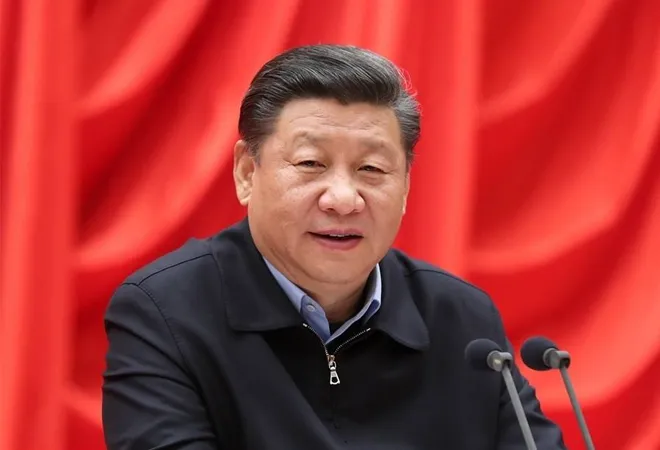One of the surest signs of the emergence of a global superpower is its ability and willingness to intervene in other states’ domestic politics. And while the West remains obsessed with Russian shenanigans in shaping the domestic political milieu and discourse in the US and West European democracies, it is China that seems to have stolen the march in this regard. In fact, 2017 will mark the year when China’s manipulation of domestic politics in other states came out of the closet.
On the one hand, its role in the removal of Robert Mugabe in Zimbabwe underscored Beijing’s growing clout in far-flung regions of the world. China was aware of the Zimbabwean army’s plans to oust Mugabe, as General Constantino Chiwenga, head of Zimbabwe’s defence forces, had visited Beijing just days before the army moved against Mugabe. At the other end of the spectrum, the Australian debate on China’s growing role in domestic matters threw down the gauntlet to Beijing. Australian prime minister Malcolm Turnbull has taken the lead in this regard, pointedly attacking the Chinese Communist Party (CCP) for covertly interfering “with our media, our universities and even the decisions of elected representatives right here in this building (parliament)”.
With the aim of curbing such influence, his government has introduced changes to national security legislation on foreign agents and banned foreign political donations. Australian media has been awash with reports about organizations linked to the CCP monitoring the 140,000 Chinese students in Australia and Beijing’s purported attempts to buy political influence through donations to political parties. Foreign minister Julie Bishop has underlined the threat to freedom of speech in Australian universities owing to Chinese students affiliated to the CCP. The Australian Security Intelligence Organisation has warned of foreign influence posing “a threat to our sovereignty, the integrity of our national institutions, and the exercise of our citizens’ rights”.
The scandal surrounding the Labor politician Sam Dastyari made this all too real for Australian polity. Dastyari was forced to resign from politics earlier this year after it was revealed that he had warned a Chinese counterpart his calls might be recorded by the Australian intelligence agency and that he had tried to encourage his party’s leadership not to meet a Chinese pro-democracy activist opposed to Beijing’s rule in Hong Kong in 2015.
With bilateral trade worth $155 billion in 2016, China is Australia’s largest trading partner and Canberra has been very reluctant to annoy it in the past, treading rather cautiously on regional geopolitical issues. It was one of the reasons why the quadrilateral initiative, between India, Japan, the US and Australia, could not move forward when it was first mooted in 2007.
Even New Zealand is confronting this challenge from China, with the country’s political elite getting manipulated by China’s patronage network. In Singapore, there have also been reports of espionage, as happened in a recent case when a “pro-Beijing” professor was expelled from Singapore for being an “agent” of a foreign power. Singapore’s ministry of home affairs alleged that the professor was engaged in activities like knowingly interacting with intelligence agencies of a foreign country to influence Singapore government policy and public opinion that were inimical to Singapore’s interest. This unprecedented move by Singapore of expelling an academician for alleged espionage has brought to the fore the role of even academia as a tool for furthering China’s state objectives.
Though obsessed with Russia, Washington is taking note. A congressional commission headed by senator Marco Rubio convened a hearing on the “long arm of China”, to highlight the “threats” posed by Beijing to Western democracies. Rubio suggested that the emerging Chinese strategy “directly threatens our most deeply held values and our national interest”. Arguing that “Chinese leaders are engaged in the long game”, he exhorted that “it is something that policymakers in the United States and our like-minded allies must take seriously”. The Trump administration’s recently released national security strategy also talks of China’s growing influence operations. It argues, “China gathers and exploits data on an unrivalled scale and spreads features of its authoritarian system, including corruption and the use of surveillance… China is using economic inducements and penalties, influence operations and implied military threats to persuade other states to heed its political and security agenda.”
In India’s own neighbourhood, China’s ability to manipulate domestic politics to its own advantage is now getting well established. From the Maldives to Nepal and Sri Lanka, this is a new reality that New Delhi will have to confront pro-actively.
As a major global power, it should not be surprising that Beijing is trying to build leverage over domestic politics in other states. Liberal democracies like India remain very vulnerable to such Chinese machinations as its capacity to launch influence operations abroad, and gain leverage over democratic rivals, attains new heights. It is not readily evident if New Delhi has properly understood the scale of the challenge it faces. It is far bigger than the military or economic threat China poses.
This commentary originally appeared in Live Mint.
The views expressed above belong to the author(s). ORF research and analyses now available on Telegram! Click here to access our curated content — blogs, longforms and interviews.




 PREV
PREV


